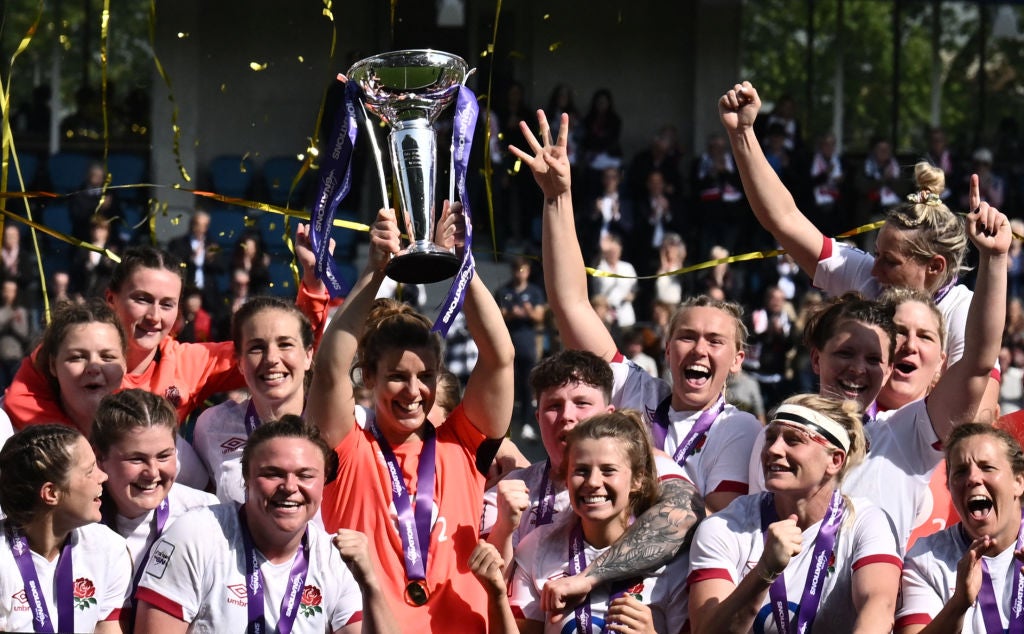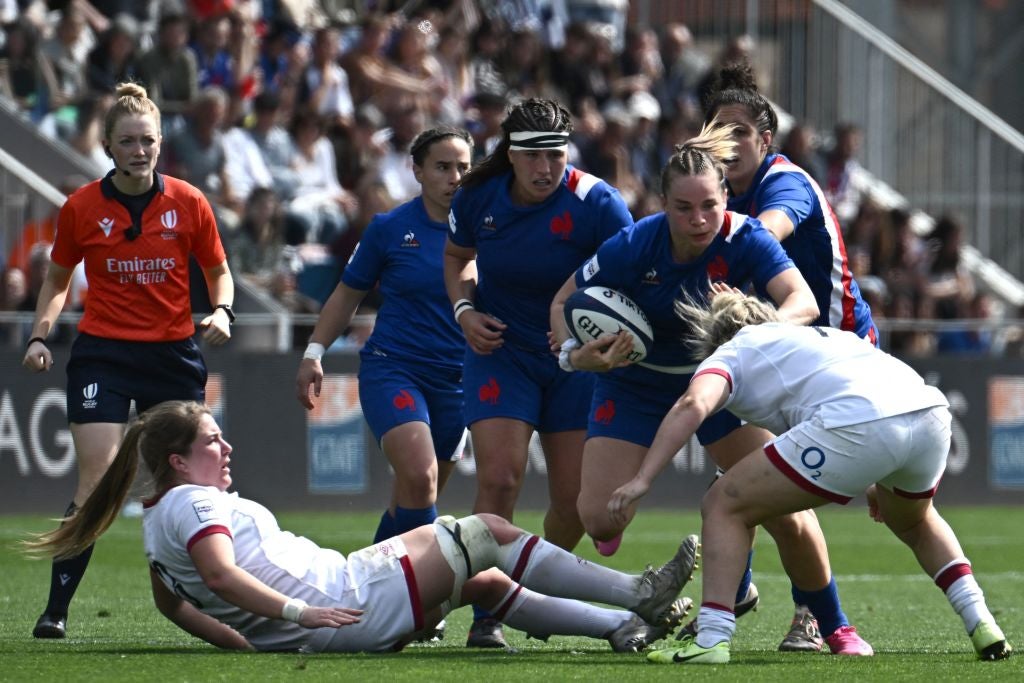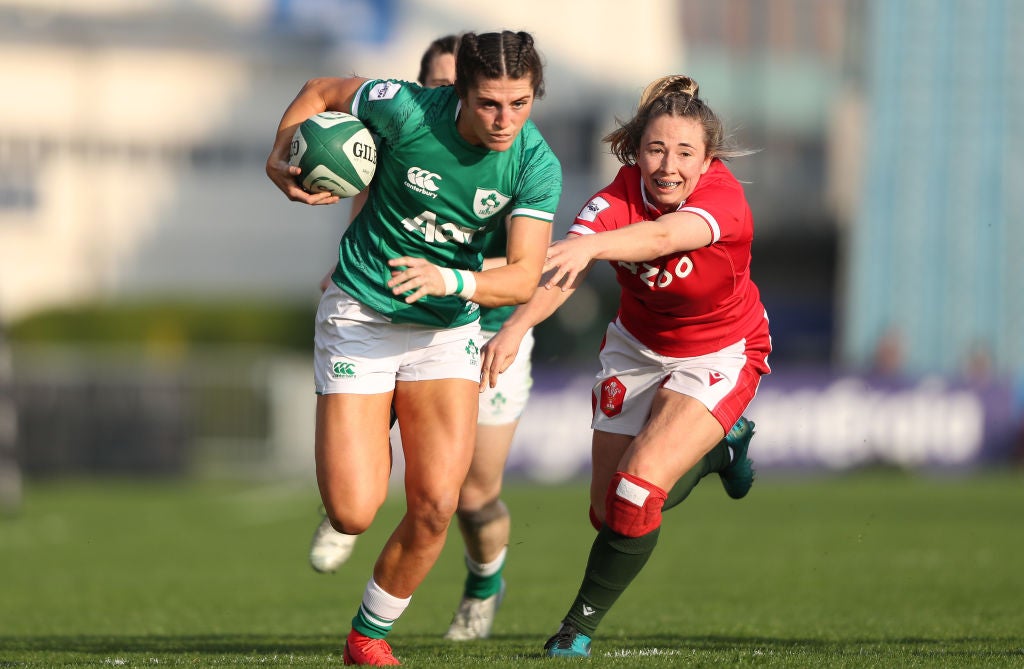Dominant England set the benchmark but Women’s Six Nations needs real competition to thrive
With England intent on pushing forwards after sealing another Women’s Six Nations crown, it is up to their rivals to match their ambition or risk being left behind

A brassy Bayonne crowd was beginning to empty as England again hoisted the Women’s Six Nations trophy aloft. A crowd of 11,000 French fans had barracked and brayed throughout to try to lift their home heroes to a first La Crunch win in four years but at the end of the 2022 tournament, as is becoming familiar, it was Simon Middleton’s squad climbing up on to the rostrum to receive their spoils – again victors of the tournament they now so thoroughly dominate.
And that is cause for concern. This has been an historic, transformative tournament, with greater broadcast, media and spectator interest than ever before. But it took until the final Saturday for there to be more than one game upon which there was genuine jeopardy and doubt.
Sport, by its very nature, thrives on competition – it is hard to market a sporting contest when it is not a contest. Ben Morel, the Six Nations chief executive, said last week that he hoped to attract more sponsors specifically for the women’s tournament, but the question is will sponsors and broadcasters have significant desire for a competition where the conclusion is foregone.
Which is why these are a crucial two years. The delay to the autumn’s World Cup had the knock-on impact of pushing back the launch of the innovative WXV competition – a welcome introduction that should provide consistent fixtures at the right level for a greater range of sides – to coincide with the 2023 Rugby World Cup in France, which may deny it potentially crucial visibility.
The recent pace of change in women’s rugby is such that the future must be mapped out with due attention. Men’s rugby made several missteps in the first years of professionalism and is grappling with wide-reaching ramifications. After a transformative tournament to provide more questions than answers, there is little doubt the future of the women’s game looks exceptionally bright - but it must be managed carefully to maximise what it could be.
It should not distract from the excellence of this England side. Yes, they are granted significant advantages as professionals and better resourced than any other nation but they are still pushing forward without complacency. The addition of Louis Deacon as forwards coach has helped sharpen their set-piece weapons that France had previously been able to blunt, and they decided the game on Saturday. England can only play what is in front of them but France, as they showed in patches at the Stade Jean Dauger, are the only side currently even remotely close - and even they have lost ten in a row to their nearest rivals.

It is not acceptable to keep asking largely amateur players to compete with those playing professionally. As England prop Sarah Bern put in in the immediacy of Grand Slam triumph on Saturday: "I would absolutely love it if everything was even. I have a lot of friends who play for Wales, Scotland and Ireland. It is really hard work.
"The [Premier 15s] is demanding more of our players and international is demanding so much of our players. Playing a game like this then having to work tomorrow - I really feel for them. I’m always there to fight for their corner because I think everyone should have equal opportunity."
There will be a cost to this, of course, but it must be looked upon as investment. Some of women’s rugby growth metrics are excellent, and certain investors are taking notice – it has been reported that part of capital firm Silver Lake’s impending deal with New Zealand Rugby will be a boost in funding for the women’s game. It was worrying, then, to hear Morel suggest ahead of the final round of the tournament that there was not yet a plan towards profitability for the Women’s Six Nations.

One of the great benefits of the standalone window is that it has brought these questions into a wider focus. Given the public pressure, it would be a surprise if next year’s tournament begins with a fully amateur side involved as all nations begin to offer more suitable contracts.
The gap may widen before it begins to narrow. Ahead of the World Cup, by dint of having 30 or so contracted professionals, England will have more preparation time than any other country. Perhaps New Zealand’s coaching staff, contracts and necessary cultural reset bring them back into contention, or France will finally get over the line, but it would not necessarily be a surprise if this fine England side crown their greatness with a cruise to victory later this year in a supreme manner akin to that of Meg Lanning’s Australian cricketers last month.
With World Cup warm-up fixtures in September expected to be confirmed, England will, barring something remarkable, depart for New Zealand having won 25 consecutive matches – a record run for any side in international rugby history. They have set the benchmark of where the women’s game can get to, and it is up to other nations to now invest to ensure they do not accelerate out of sight.
Join our commenting forum
Join thought-provoking conversations, follow other Independent readers and see their replies
Comments
Bookmark popover
Removed from bookmarks